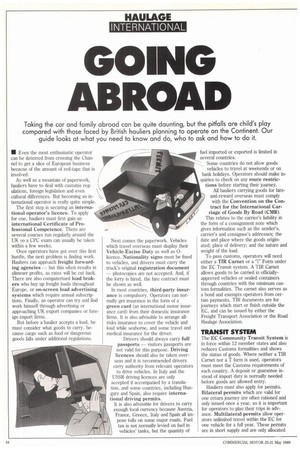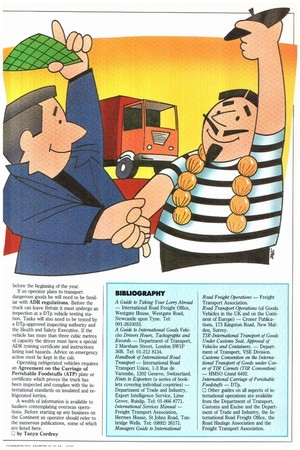GOING ABROAD
Page 46

Page 47

If you've noticed an error in this article please click here to report it so we can fix it.
Taking the car and family abroad can be quite daunting, but the pitfalls are child's play compared with those faced by British hauliers planning to operate on the Continent. Our guide looks at what you need to know and do, who to ask and how to do it.
• Even the most enthusiastic operator can be deterred from crossing the Channel to get a slice of European business because of the amount of red-tape that is involved.
As well as a mountain of paperwork, hauliers have to deal with customs regulations, foreign legislation and even cultural differences. But becoming an in\ ternational operator is really quite simple.
The first step is securing an international operator's licence. To apply for one, hauliers must first gain an international Certificate of Professional Competence. There are several courses run regularly around the UK so a CPC exam can usually be taken within a few weeks.
Once operators have got over this first hurdle, the next problem is finding work. Hauliers can approach freight forwarding agencies — but this often results in slimmer profits, as rates will be cut back. There are also computerised load brokers who buy up freight loads throughout Europe, or on-screen load advertising systems which require annual subscriptions. Finally, an operator can try and find work himself through advertising or approaching UK export companies or foreign import firms.
But before a haulier accepts a load, he must consider what goods to carry, because cargo such as food or dangerous goods falls under additional regulations.
Next comes the paperwork. Vehicles which travel overseas must display their Vehicle Excise Duty as well as 0licence. Nationality signs must be fixed to vehicles, and drivers must carry the truck's original registration document — photocopies are not accepted. And, if the lorry is hired, the hire contract must be shown as well.
In most countries, third-party insurance is compulsory. Operators can normally get insurance in the form of a green card (an international motor insurance card) from their domestic insurance firms. It is also advisable to arrange allrisks insurance to cover the vehicle and load while seaborne, and some travel and medical insurance for the driver.
Drivers should always carry full passports — visitors passports are not valid for this purpose, Driving licences should also be taken overseas and it is recommended drivers carry authority from relevant operators to drive vehicles. In Italy and the USSR driving licences are only accepted if accompanied by a translation, and some countries, including Hungary and Spain, also require international driving permits.
It is also advisable for drivers to carry enough local currency because Austria, France, Greece, Italy and Spain all impose tolls on some major roads. Fuel tax is not normally levied on fuel in vehicles' tanks, but the quantity of fuel imported or exported is limited in several countries.
Some countries do not allow goods
vehicles to travel at weekends or on bank holidays. Operators should make inquiries to check on any route restrictions before starting their journey.
All hauliers carrying goods for hire and-reward overseas must comply
with the Convention on the Con tract for the International Carriage of Goods By Road (CMR). This relates to the carrier's liability in the form of a consignment note which gives information such as the sender's, carrier's and consignee's addresses; the date and place where the goods originated; place of delivery; and the nature and weight of the load.
To pass customs, operators will need either a TIR Carnet or a 'T' Form under the EC Transit system. A TIR Carnet allows goods to be carried in officiallyapproved vehicles or sealed containers through countries with the minimum custom formalities. The carnet also serves as a bond and exempts operators from certain payments. TIR documents are for journeys which start or finish outside the EC, and can be issued by either the Freight Transport Association or the Road Haulage Association.
TRANSIT SYSTEM
The EC Community Transit System is in force within 12 member states and also reduces Customs formalities and shows the status of goods. Where neither a TIR Carnet nor a T form is used, operators must meet the Customs requirements of each country. A deposit or guarantee instead of import duty is normally needed before goods are allowed entry.
Hauliers must also apply for permits. Bilateral permits which are valid for one return journey are often rationed and only issued once a year, so it is important for operators to plan their trips in advance. Multilateral permits allow operators unlimited travel within the EC for one vehicle for a full year. These permits are in short supply and are only allocated before the beginning of the year.
If an operator plans to transport dangerous goods he will need to be familiar with ADR regulations. Before the truck can leave Britain it must undergo an inspection at a DTp vehicle testing station. Tanks will also need to be tested by a DTp-approved inspecting authority and the Health and Safety Executive. If the vehicle has more than three cubic metres of capacity the driver must have a special ADR training certificate and instructions listing load hazards. Advice on emergency action must be kept in the cab.
Operating refrigerated vehicles requires an Agreement on the Carriage of Perishable Foodstuffs (ATP) plate or certificate which proves the truck has been inspected and complies with the international standards on insulated and refrigerated lorries.
A wealth of information is available to hauliers contemplating overseas operations. Before starting up any business on the Continent an operator should refer to the numerous publications, some of which are listed here.
0 by Tanya Cordrey












































































































